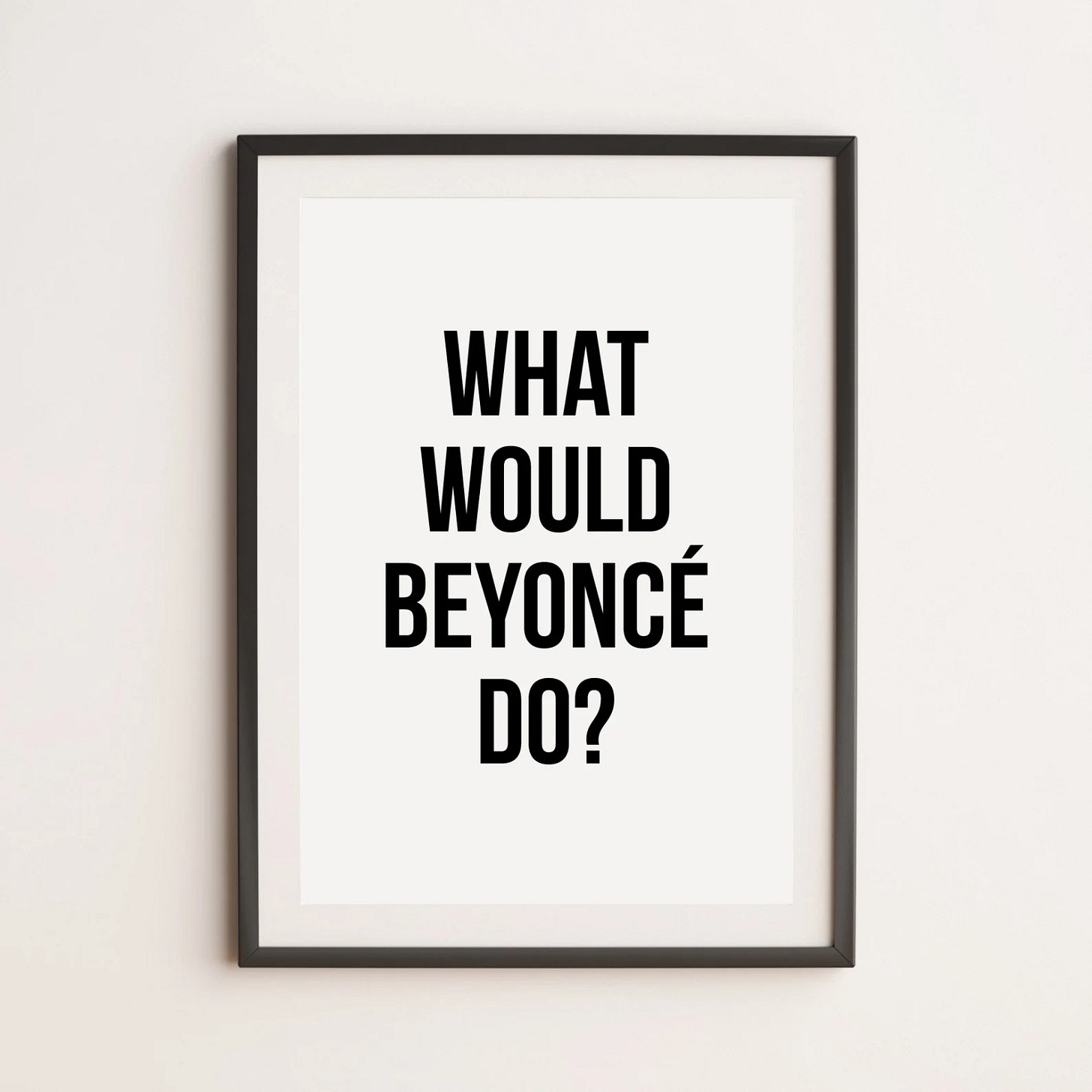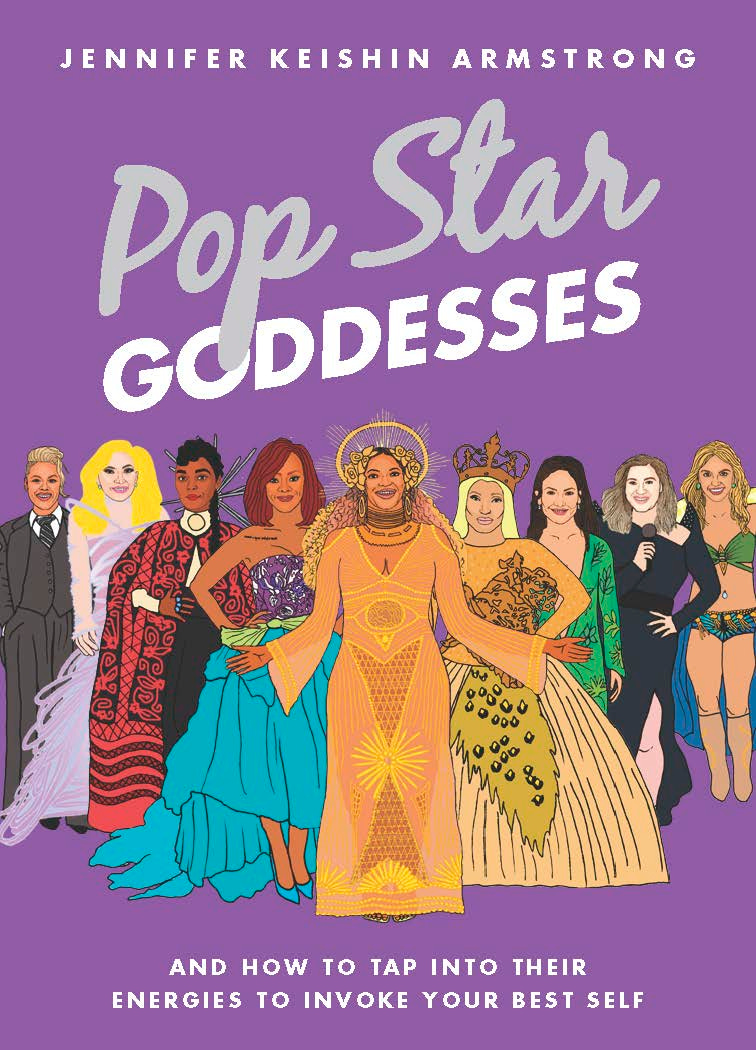How to Be a Boss Like Beyoncé
An appreciation of the Pop Star Goddess's commanding leadership skills.
I had that “What Would Beyoncé Do?” sign up over my desk for years, and sometimes it genuinely made a difference for me. I’d be on a call and suddenly I would speak up for myself a little more, ask for more money, tell an editor I didn’t want to take their well-meaning suggestion.
Obviously Beyoncé has advantages the rest of us don’t: She is genetically gifted in a number of ways (all the ways?), and is now rich and powerful beyond most of our comprehension. But she also projects something special, different from even her peers—there’s a feeling that she’s totally in command of her art and her business, even though both include scores of collaborators and employees working for her at any given time.
And what we’ve learned through her behind-the-scenes documentaries, particularly Homecoming and Renaissance, is that she is very good at being a boss. She is involved and exacting: In Homecoming, which shows both her historic Coachella performances in 2018 and the backstage work that went into them, she says, “I respect things that take work, I respect things that are built from the ground up. I’m super specific about every detail. I personally selected each dancer, every light, the material on the steps, the height of the pyramid, the shape of the pyramid, every patch was hand-sewn. Every tiny detail had an intention.”
In Renaissance, she explains, “Communicating as a Black woman, everything is a fight. I constantly have to repeat myself.” Two scenes demonstrate this: In the first, a man tells her that a lens she wants is not available; only after she expresses skepticism does he relent and find it. In the second, another man tells her a certain camera track is nowhere to be found; she responds that she already found it herself online, so she’d now like someone to get it, please.
I replay these moments in my head—and sometimes literally on Netflix, in the case of Homecoming—whenever I need an extra boost of assertiveness. In my 2020 book Pop Star Goddesses, I wrote about Beyoncé as the Goddess of Power Through Sacred Partnership, admiring the strength of her marriage to Jay-Z. But as I’ve been revisiting the book in what feels like an era of even more Pop Star Goddess power, I realize that she has evolved into a model of female leadership. In these films, she’s the boss, with Jay-Z playing supportive husband, the Doug Emhoff to her Kamala Harris.
Here are the major lessons I’ve learned from watching Beyoncé work:
 Tiktok failed to load.
Tiktok failed to load.Enable 3rd party cookies or use another browser
Be Confident
No one exudes more confidence than Beyoncé. She boasts in her lyrics like a rapper: “If you leave me, you’re outta your mind,” “I know when you were little girls, you dreamt of being in my world.” Yet, she has a knack for providing braggy refrains that invite her audience into their glow; she’s not bragging at us, she’s bragging with us. Think of her audiences chanting “I woke up like this” or “Feelin’ myself” along with her. But perhaps my favorite moment of Beyoncé bravado comes from “Don’t Hurt Yourself”: “Who the fuck do you think I am?/ You ain’t married to no average bitch, boy.” The song, and in fact most of the album it comes from, Lemonade, is a dis track aimed at her cheating husband (we presume). I love this couplet’s combination of confidence, anger, vulnerability, and, well, honesty. She is Beyoncé. What is wrong with him?
Be Assertive, But Gracious
She knows how to communicate that something that might be perfectly good to other people isn’t up to her standards. At one point in Homecoming, as we watch what look like great rehearsals, she tells her team that she’s not satisfied with how the movement is looking on camera, calling it “janky” and “not translating.” As this goes on, she gets more forceful: “Until I see some of my notes applied,” she says, “it doesn’t make sense for me to make more.” But she also knows how to give positive reinforcement. “I know everybody’s working hard, so we’ll get there,” she says.
Use Your Work to Lift Up Others
Her last three albums in particular—Black Is King, Renaissance, and Cowboy Carter—exemplified this direction, drawing on African pop, the history of Black and queer dance music, and the Black roots of country music. Given her cultural power, she knows that she can spotlight what she thinks is important. And when your work goes beyond your own ego, it’s that much easier to celebrate; it also invites new people into your orbit. Promoting your album becomes not an exercise in self-involvement, but a cause. She features guest artists on all of these albums as well, sharing her success with them. “After all that we’ve been through in the world, I feel like we all want a place to be safe and connected to other human beings,” she says in Renaissance. “Everyone has a thirst for community.” No artist has built a community as inclusively as she has.
Be the Best
It’s clear that Beyoncé has worked hard to make herself one of the greatest pop stars of all time. But she’s also set the bar even higher than that for her work: “It’s not about being perfect,” she told GQ earlier this year. “It’s about being revolutionary.”






